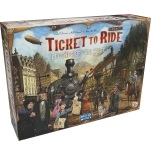Camel Up Boardgame Mobile App

iPad users got a pleasant surprise in late September when a new app version of the Spiel des Jahres-winning family game Camel Up (which I reviewed here) last year) appeared with little or no advance warning. The app, available for iOS and Android devices, implements the game simply and elegantly but is very light on instructions, and I’m not sure I understand what the highest-level AI opponents are trying to do.
Camel Up is a very light betting game where two to eight players place small and large bets on the outcome of a race involving five camels moving around a sixteen-space track one to three spaces at a time. The race itself is divided into “legs,” which last until each of the five camels has moved by the roll of each of the five dice associated with the camels. Players place bets on the outcome of the current leg (first place) or of the race as a whole (first or last place), and a player can put special tiles on the track to advance camels by a space or force them to retreat by one, earning an extra coin for each time a camel lands on his/her tile.
The app takes the graphics directly from the game and benefits from bright, clear presentation that makes it immediately clear what’s going on in almost all cases. (The one exception is when a player uses his/her turn to bet on the results of the entire race, which could be much clearer.) There is no tutorial, however, and the instructions in the app are much shorter than those that come with the physical game, so if you have never played it before, you would have no way of knowing what those special player tiles do, or that players can bet on more than one camel to win the race, or what the payouts and penalties are for correct or incorrect bets. You have to know the rules already to get anything from the app.
-

-

-

-

-

-

-

-

-

-

-

-

-

-

-

-

-

-

-

-

-

-

-

-

-

-

-

-

-

-

-

-

-

-

-

-

-

-

-

-










































